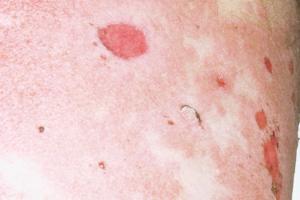Bullous pemphigoid
Bullous pemphigoid is a rare skin condition that causes itching, redness and blisters. It may last a few years and sometimes causes serious problems, but treatment can help. See your GP if you think you have the condition.
Check if you have bullous pemphigoid
Bullous pemphigoid mainly affects people over 60 years old.
Bullous pemphigoid usually starts as sore, itchy red patches.
It can affect large areas of the body or limbs.
After a few weeks, small blisters may appear. The blisters can grow quite big and may contain blood.

Not everyone gets blisters. If you do, they may keep coming and going for months or years.
There are several other causes of blisters, if you're not sure it's bullous pemphigoid.
When to see your GP
You should see your GP if:
- you have an itchy red rash that doesn't go away in a few weeks
- you have lots of blisters, or big, painful blisters
- you have blisters that keep coming back
- your skin is red, hot and swollen, or a blister is filled with green or yellow pus
Your GP can check what the cause might be.
If they think it could be bullous pemphigoid, they may refer you to a specialist for tests and treatment.
Treatment for bullous pemphigoid
Bullous pemphigoid eventually goes away on its own, but it can last a few years.
Treatment can help your skin heal, stop new patches or blisters appearing and reduce the risk of your skin getting infected.
The main treatments are:
Your skin should eventually heal without scarring, but it might be a bit darker than it was before.
It is important that you don't burst your blisters, as your skin might get infected.
If a blister is in an annoying place (like the bottom of your foot), your doctor can drain it with a needle.
Bullous pemphigoid can be serious
Even with treatment, bullous pemphigoid can sometimes cause serious problems.
The main risks are:
- skin infections – these can be very serious if they get deeper into your body (sepsis)
- side effects of steroid treatment – including high blood pressure, weakened bones and a higher risk of getting infections
Steroids will be used as little as possible and at the lowest possible dose to help avoid side effects.
Make sure you go to any check-ups your doctor recommends, so problems can be spotted and treated early.
Causes of bullous pemphigoid
Bullous pemphigoid is caused by a problem with the immune system (the body's defence against infection). Instead of attacking germs, it attacks and damages the skin.
It's not known why this happens. Sometimes it's been linked to skin damage (such as sunburn) or taking certain medicines.
Bullous pemphigoid is not:
- contagious – it can't be spread to other people
- caused by an allergy
- affected by diet or lifestyle
- Bullous pemphigoid
More useful links
The information on this page has been adapted from original content from the NHS website.
For further information see terms and conditions.